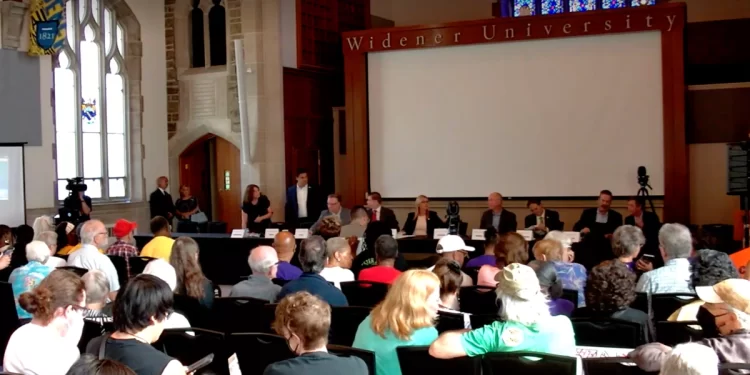By Anthony Hennen | The Center Square
(The Center Square) — A proposed liquefied natural gas terminal in Chester leaves some residents anxious about further environmental degradation, while advocates make promises of economic growth.
The Philadelphia LNG Export Task Force met in Chester on Tuesday, with jobs and tax revenue at the front of the mind for both members and testifiers.
“Pennsylvania’s unique natural gas reserves have the potential to drive economic growth, inspire innovation, and create new opportunities.” Rep. Martina White, R-Philadelphia and chair of the task force, said. “It is not only about job creation but ensuring and resurging industries, revitalizing communities, and empowering our workforce.”
Counties with a large natural gas footprint wouldn’t be the only places that would benefit from an LNG terminal, supporters said. Chester would see big gains as well.
“This means jobs and significant tax revenue for an area of the commonwealth that desperately needs it,” Carl Marrara, executive director of the Pennsylvania Manufacturers Association, said. “This is about employing good, hard-working Pennsylvanians and making Pennsylvania an actual energy leader in the world.”
The proposed terminal would be built by Penn America Energy on a 100-acre brownfield site on the Chester riverfront, an estimated $4 billion-$8 billion project, to export 7 million metric tons of LNG annually. Penn America argues that the facility would be more than 99% carbon neutral and reduce shipping time by 30% compared to shipping from a Louisiana LNG terminal. A timeline on the company’s website estimates that cargo would start to leave the terminal in 2028.
Residents who testified at the meeting, however, are skeptical about the jobs gains — and worry about the health and environmental effects.
“We suffer for everybody else’s comfort,” Zulene Mayfield, chairwoman of Chester Residents Concerned for Quality Living, said.
She pointed to the city’s incinerator, which burns trash from outside Chester and contributes to the city’s poor air quality and negative health effects.
“(We) in the city of Chester have nothing to gain from this,” Mayfield said. “Our bodies, the health of our community, will not be prostituted for pollution, for no LNG, for no incinerator — your money, we don’t need it. We’re okay.”
An economic impact study on the LNG terminal found that, over five years, it would support 31,000 jobs and create $7 billion in “total output,” Marrara said. However, the assumptions and numbers used for the study weren’t available.
Rep. Joe Hohenstein, D-Philadelphia, asked Marrara for those details, but Marrara said it would take a few weeks to provide that information to Hohenstein and the task force.
Economic impact studies are often used to support plans for new sports stadiums or large industrial developments. Yet, they have been criticized for relying on “inaccurate or undependable information” and portraying potential job numbers and tax revenue “with little or no sense of the uncertainty involved.”
“These studies ignore basic principles of economics and, as a result, do not meaningfully measure what they claim to be measuring—the economic impact of the public policies and projects that they are assessing,” the John Locke Foundation, a public policy think tank in North Carolina, argued.
Brian Balfour, senior vice president of research at the foundation, later clarified that the organization’s criticism targets government-funded projects specifically, which “fail to take into account the opportunity costs involved when government diverts tax dollars to ‘invest’ in a project.” The privately-funded proposal would reclaim an unused brownfield for the hub, eliminating the cost issue.
Task force members, however, praised the economic impact study.
“Quite an impressive report you’ve presented to us today,” said Stephanie Wissman, executive director of the American Petroleum Institute.
Marrara also recommended broad policy changes, including permitting reform for pipelines, critical infrastructure, and manufacturing facilities, more workforce and training programs, and improving Pennsylvania’s business competitiveness to attract more projects.
The hypothetical benefits for Chester would also boost natural gas production across the commonwealth.
LNG would be the pathway for us to do more,” said Toby Rice, president and CEO of EQT, an energy company that made the largest impact fee payments of all natural gas producers in Pennsylvania last year.
Political leadership in Chester, however, still aren’t convinced.
“New polluting industries are not welcome in Chester,” Stefan Roots, Chester city councilman and presumptive mayor, said. “The health and safety of Chester residents have been harmed for too long.”
Nor was Roots impressed with promises of economic growth.
“Chester doesn’t have a single primary care doctor left in the city to treat our citizens,” Roots said. “LNG will discourage new investment in homes and businesses. An LNG terminal will result in population depletion.”
Corrections and Clarifications
The name of Carl Marrara, executive director of the Pennsylvania Manufacturers Association, has been updated in the article since publication.




